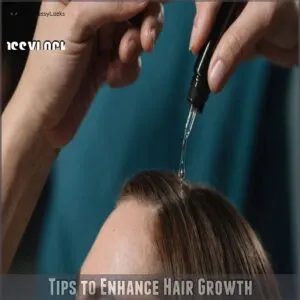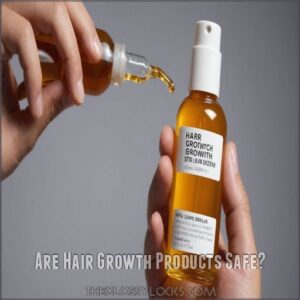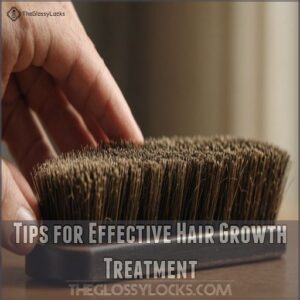This site is supported by our readers. We may earn a commission, at no cost to you, if you purchase through links.
 You’ll find the best hair growth solutions combine science-backed ingredients with proper usage.
You’ll find the best hair growth solutions combine science-backed ingredients with proper usage.
FDA-approved treatments like minoxidil work alongside biotin and peptide-rich formulas to boost your hair’s thickness and stimulate new growth.
While no magic bullet exists, you’re in control of choosing products that match your specific needs – whether you’re battling age-related thinning or stress-induced shedding.
Clinical studies show that consistent use of proven ingredients can greatly improve your results.
The key lies in understanding which potent combinations will work best for your unique situation and hair goals.
Table Of Contents
- Key Takeaways
- What Causes Hair Loss or Thinning?
- Tips to Enhance Hair Growth
- The Best Hair Growth Products
- 1. Rogaine 5 Minoxidil Foam Hair Regrowth
- 2. Nutrafol Women Hair Growth Supplements
- 3. Vital Proteins Collagen Powder Supplement
- 4. Nutrafol Conditioner for Thinning Hair
- 5. Nutrafol Shampoo Cleanse Hydrate Hair
- 6. Nutrafol Women Hair Growth Serum
- 7. Nutrafol Hair Growth Supplements for Women Over 45
- 8. Essynaturals Hair Growth Oil Biotin Caffeine Castor
- Are Hair Growth Products Safe?
- Tips for Effective Hair Growth Treatment
- Frequently Asked Questions (FAQs)
- Do hair growth products work?
- Are hair growth products safe?
- What product is best for hair growth?
- Is there anything that really helps hair grow?
- What’s the best thing for hair growth?
- What helps your hair grow quicker?
- What is the best source for hair growth?
- What hair treatment is best for growth?
- How long before seeing results from hair treatments?
- Can pregnancy affect hair growth and thickness?
- Do vitamins and supplements really help regrow hair?
- Is hair transplant surgery worth the investment?
- Does scalp massage stimulate natural hair growth effectively?
- Conclusion
Key Takeaways
- You’ll see the best results by combining FDA-approved treatments like minoxidil with essential nutrients, including biotin, iron, and vitamin D supplements that target your specific deficiencies.
- Your hair loss can stem from multiple factors including hormonal changes, nutritional gaps, medical conditions, and lifestyle habits – identifying the root cause is crucial for choosing effective treatments.
- You can boost your hair growth naturally through daily scalp massage, protective hairstyles, and using products like sea buckthorn oil benefits that restore hair elasticity and regulate scalp moisture, and avoiding damaging practices like excessive heat styling and tight hairdos.
- You’ll need to commit to a consistent treatment plan for 3-6 months, as 85% of users notice significant improvements within this timeframe when following proper hair care routines.
What Causes Hair Loss or Thinning?
If you’ve noticed more hair in your brush or drain lately, you’re not alone as hair loss can be triggered by various factors including hormonal changes, nutritional gaps, medical conditions, and lifestyle habits.
Your hair’s health is influenced by both internal factors like aging and external stressors, but understanding the root cause is your first step toward finding an effective solution.
Aging and Hormonal Changes
Two major factors can shake up your hair game as you age: hormones and Father Time.
During menopause, dropping estrogen levels often lead to thinning hair, while conditions like thyroid imbalances can throw your hair growth cycle off track.
Taking the right supplements, such as those found in popular hair loss vitamins, can also play a significant role in addressing hormonal imbalances that contribute to hair loss.
Androgenetic alopecia, the scientific name for pattern hair loss, affects both men and women when hormone changes make hair follicles more sensitive to DHT.
Nutritional Deficiencies
Nutritional deficiencies can also be linked to excessive shedding due to a lack of proper hydration and moisture, a common issue in 4c hair breakage and shedding. Several key nutritional deficiencies can weaken your hair and trigger excessive shedding.
When your body lacks iron, biotin, or zinc, your hair follicles can’t function properly.
Consider using natural hair growth supplements for thinning hair that contain these essential nutrients, such as biotin, vitamin C, and omega-3 fatty acids found in natural hair growth supplements.
Low vitamin D levels may also contribute to hair loss, while inadequate protein intake can make your strands brittle and prone to breakage.
Luckily, you can take control by adjusting your diet or considering supplements under professional guidance.
Medical Conditions
Medical conditions affecting your hair growth can be like hidden puzzles that need solving.
Autoimmune disorders like alopecia areata cause patches of hair loss when your immune system mistakenly attacks hair follicles.
Thyroid imbalances, whether overactive or underactive, often lead to thinning hair.
Scalp infections, including fungal conditions, can damage follicles and impair growth.
Hormonal conditions like PCOS may trigger hair loss patterns similar to male pattern baldness.
Stress and Lifestyle Factors
Your daily stress levels can trigger a condition called telogen effluvium, pushing your hair follicles into a resting phase.
Think of it like your body hitting pause on hair growth when you’re overwhelmed.
Poor sleep, skipping meals, and crash dieting aren’t doing your locks any favors either.
The good news? These factors are within your control, and simple lifestyle tweaks can help your hair thrive again.
Tips to Enhance Hair Growth
You’ll find that growing healthier, fuller hair doesn’t require a medicine cabinet full of expensive products, as simple lifestyle changes and proven techniques can effectively stimulate hair growth.
While genetics play a role in your hair’s natural growth cycle, you can enhance your results by combining the right hair care practices with science-backed solutions that target the root causes of hair thinning.
Healthy Diet and Lifestyle Habits
Living a balanced lifestyle packs a powerful punch for hair health.
Boost your growth potential with protein-rich foods like eggs, fish, and legumes, paired with plenty of water throughout the day.
Regular exercise improves blood flow and hormone balance, while quality sleep helps repair and regenerate hair follicles.
Managing stress through meditation or yoga can prevent stress-related hair loss.
Scalp Massage and Blood Circulation
Three minutes of daily scalp massage can boost blood flow by 54%, stimulating dormant hair follicles.
Using your fingertips, work in circular motions across your scalp – think of it like watering a garden to encourage growth.
For extra impact, try tools like scalp massagers or brushes during your shower routine.
This simple practice promotes hair growth but also feels incredibly relaxing too.
Avoiding Damaging Hair Practices
While scalp massage boosts circulation, certain hair habits can undo all that good work.
Bad styling practices pack a double punch – they damage your hair and can trigger hair loss.
Take control by avoiding these common mistakes and exploring techniques like protective hairstyles for hair growth.
- Skip daily heat styling and opt for heatless alternatives
- Loosen up those tight ponytails and braids that stress your scalp
- Say goodbye to harsh chemical treatments and excessive coloring.
These small changes make a big difference in protecting your hair’s health.
The Best Hair Growth Products
You’ll find science-backed hair growth products that work with your body’s natural processes, featuring ingredients like sea salt for hair growth that can stimulate blood flow and reduce inflammation to promote healthy hair, to combat thinning and promote regrowth.
From FDA-approved treatments to dermatologist-recommended supplements, these top solutions offer proven results for various types of hair loss.
1. Rogaine 5 Minoxidil Foam Hair Regrowth
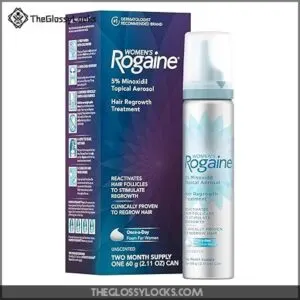
As the #1 dermatologist-recommended brand, Rogaine’s 5% minoxidil foam has proven itself over three decades.
You’ll appreciate its once-daily application and Tricho-Prime technology, which keeps your scalp comfortable while promoting growth.
The foam formula delivers 48% thicker hair with consistent use, though patience is key – results typically appear after a few months.
Each 2.11-ounce bottle provides a 2-month supply, making it a practical investment in your hair’s future.
For best results, start treatment early and apply it across your entire scalp.
Best For: People looking for a clinically proven, dermatologist-recommended hair regrowth solution.
- Clinically proven to regrow hair that is 48% thicker
- Features Tricho-Prime technology to condition the scalp and prevent dryness and irritation
- Once-a-day application for convenience
- May take several months to see results
- May cause initial hair loss
- Can be used less frequently once hair regrowth is established
2. Nutrafol Women Hair Growth Supplements

Nutrafol’s clinically proven supplement packs a powerful punch with 21 natural ingredients targeting multiple causes of hair thinning.
You’ll find a proprietary blend that works from the inside out, addressing everything from stress to nutrition.
Clinical studies back up its effectiveness – 90% of women reported better overall hair after 6 months, while 84% noticed less shedding.
Taking 4 capsules daily can show visible results within 3-6 months.
Plus, it’s dermatologist-recommended and safe for all hair types, though you might want to check with your doctor first.
Best For: Women between 18 and 44 struggling with hair thinning.
- Clinically proven to improve hair growth and reduce shedding.
- Targets multiple causes of hair thinning, including stress, lifestyle, and nutrition.
- Dermatologist-recommended and safe for all hair types.
- May be expensive.
- May be difficult to find authentic products from resellers.
- Results may vary and may take time to appear.
3. Vital Proteins Collagen Powder Supplement

The powerhouse Vital Proteins Collagen Powder Supplement delivers a potent blend of 20g collagen peptides, vitamin C, and hyaluronic acid to support your hair growth journey.
Sourced from grass-fed, pasture-raised bovine, this unflavored powder dissolves easily in your favorite beverages.
You can find a wide selection of Vital Proteins Collagen Hair Growth products here on Amazon.
You’ll appreciate its versatility – it’s gluten-free, dairy-free, and Whole30 approved.
Customer reviews highlight noticeable improvements in hair growth and strength with consistent use.
The formula packs additional benefits for skin hydration and joint health, making it a smart choice for your overall wellness routine.
Best For: Those looking for a collagen supplement to support hair growth, skin hydration, and joint health.
- Supports hair growth and strength.
- Provides skin hydration and joint mobility benefits.
- Gluten-free, dairy-free, and Whole30 approved.
- Some users experience a mild taste with two scoops.
- Initial breakouts are possible as skin adjusts to increased collagen.
- Consistent use and patience are needed for optimal results.
4. Nutrafol Conditioner for Thinning Hair
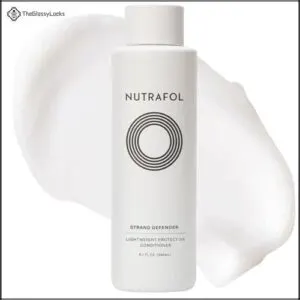
Silky-smooth tresses await with this lightweight daily conditioner, specially formulated for thinning hair.
You’ll love how it strengthens strands and boosts moisture without weighing hair down.
Clinical results show impressive stats – 94% of women reported more hydrated hair, while 92% saw visible improvements in just two weeks.
The silicone-free formula features nourishing Ximenia oil, protective postbiotics, and strengthening Arginine.
For best results, pair it with Nutrafol’s purifying shampoo.
While most users rave about improved hair health, some reported skin sensitivity – so patch test first.
Best For: Women experiencing thinning hair who want to strengthen and hydrate their strands.
- Improves hair hydration and elasticity.
- Lightweight formula for daily use.
- Features nourishing and protective ingredients.
- Some users reported skin sensitivity.
- Potential issues with product dispensing.
- May not be suitable for all hair types.
5. Nutrafol Shampoo Cleanse Hydrate Hair
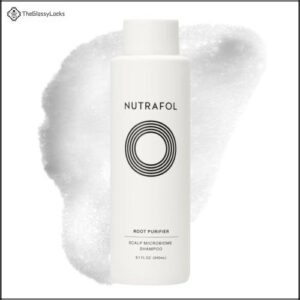
Powered by physician-formulated ingredients, this sulfate-free shampoo delivers impressive results for thinning hair concerns.
You’ll notice immediate improvements in scalp dryness and flakiness, with clinical studies backing up these claims.
The formula combines Australian Wild Berries, vegan proteins, and prebiotics to cleanse without stripping your scalp’s natural balance.
While some users mention a strong fragrance, the majority praise its effectiveness in reducing oil buildup and improving hair texture.
Think of it as your scalp’s personal reset button – though it works best when paired with other Nutrafol products.
Best For: This shampoo is best for women with thinning hair who are seeking a gentle, hydrating, and volumizing cleanse.
- Clinically proven to reduce dryness and flakiness.
- Delivers a deep cleanse without stripping the scalp’s natural oils.
- Improves hair texture and reduces oil buildup.
- Some users report a strong fragrance.
- Price point may be high for some.
- Hair loss benefits may be minimal for some users.
6. Nutrafol Women Hair Growth Serum
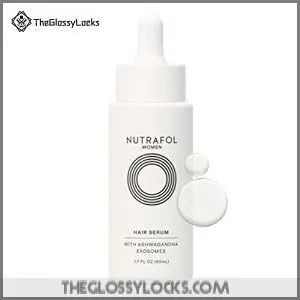
Looking for a game-changer in your hair growth journey?
Nutrafol’s Women Hair Growth Serum delivers targeted scalp nourishment through its patent-pending Ashwagandha Exosome technology.
This lightweight, fast-absorbing formula works best when paired with Nutrafol supplements, showing visible results within 90 days.
Users praise its ability to reduce postpartum shedding and increase hair fullness, though some find it pricey.
While the vegan formula features Irish Moss Peptides and Pea Sprout Extract, success requires consistent daily application.
Consider it as part of a thorough hair growth strategy.
Best For: Women seeking a clinically-tested serum to support thicker, stronger hair.
- Lightweight and fast-absorbing formula.
- Vegan ingredients, including Ashwagandha Exosomes, Irish Moss Peptides, and Pea Sprout Extract.
- Visible results in as little as 90 days when used consistently.
- Expensive compared to other hair growth products.
- Some users experience oily hair or thin, runny consistency.
- Potential for product tampering concerns.
7. Nutrafol Hair Growth Supplements for Women Over 45
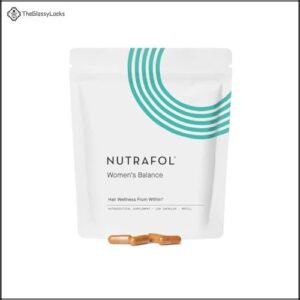
Targeting six root causes of thinning hair, Nutrafol Women’s Balance supplements help women over 45 navigate menopause-related hair changes.
Through a clinically-tested blend of 21 ingredients, including Maca, Ashwagandha, and Saw Palmetto, you’ll notice visible improvements in 3-6 months.
In studies, 93% of users reported healthier-looking hair after 6 months, while 100% showed enhanced growth after 9 months.
While some users note weight gain as a side effect, this dermatologist-recommended brand delivers thorough hair support with eco-friendly refill pouches that minimize environmental impact.
Best For: Women over 45 experiencing hair thinning due to menopause.
- Clinically tested formula with visible results in 3-6 months.
- Supports hair growth by addressing six root causes of thinning.
- Eco-friendly refill pouches minimize environmental impact.
- Some users have reported weight gain as a side effect.
- May be expensive compared to other hair growth supplements.
- Requires consistent use for optimal results.
8. Essynaturals Hair Growth Oil Biotin Caffeine Castor
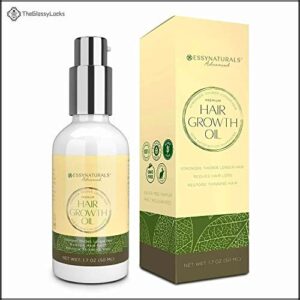
Blending biotin, caffeine, and castor oil, EssyNaturals delivers a powerful triple-action formula that’s gaining traction among those seeking natural hair growth solutions.
You’ll appreciate how this lightweight serum absorbs quickly without leaving residue.
Studies show that caffeine can block DHT, while biotin strengthens hair from root to tip.
Users report seeing results in as little as two weeks with consistent twice-daily use.
The natural rosemary scent makes application a pleasant experience, and a little goes a long way – just 2-4 drops per session does the trick.
Best For: Those looking for a natural hair growth solution can try incorporating coconut oil for hair nourishment, as seen in various natural hair growth remedies at home using natural hair growth remedies. Those looking for a natural hair growth solution that strengthens hair and reduces hair loss.
- These products often include Vitamin B5, which plays a crucial role in hair growth and health benefits. Contains natural ingredients that are known to benefit hair health.
- Users report positive results with consistent use.
- Gentle on the scalp and only a small amount is needed per application.
- May leave hair dry if used for an extended period.
- Consistency is key for optimal results, which may take several months.
- May not be suitable for all hair types.
Are Hair Growth Products Safe?
You’ll want to know if those promising hair growth products you’re eyeing are actually safe to use, especially since they’ll be in contact with your scalp for extended periods.
While many hair growth solutions contain FDA-approved ingredients like minoxidil and finasteride, it’s important to check with your dermatologist to find the right product that matches your specific needs and won’t cause unwanted side effects.
FDA-Approved Ingredients
For FDA-approved hair growth treatments, there are just two main players: Minoxidil and Finasteride.
These DHT blockers have proven their worth in clinical trials, showing real results for many people dealing with hair loss.
For those looking to try Minoxidil, it’s easily available in various forms, including a convenient topical Minoxidil foam solution.
Minoxidil comes as a topical solution or foam, while Finasteride is taken as a pill.
Everything else on the market? They might help, but they don’t have that official FDA stamp.
Dermatologist Recommendations
Dermatologists stand up for these proven hair growth treatments that actually deliver results.
They emphasize choosing products with scientifically-backed ingredients, rather than falling for marketing hype.
Leading skin docs recommend:
- Consulting a board-certified dermatologist before starting any treatment
- Looking for products containing FDA-approved minoxidil or finasteride
- Sticking to reputable brands with published clinical studies
Always get personalized advice since hair loss has many causes.
Potential Side Effects
Hair growth products can trigger various side effects that you should watch for.
Here’s a detailed breakdown of common reactions and their frequency:
| Side Effect | Severity | Frequency |
|---|---|---|
| Skin irritation | Mild-Moderate | Common |
| Scalp dryness | Mild | Very Common |
| Hair texture changes | Mild | Occasional |
| Allergic reactions | Moderate-Severe | Rare |
| Hormonal imbalances | Moderate | Uncommon |
Always do a patch test before full application and stop using any product that causes discomfort.
Tips for Effective Hair Growth Treatment
You’ll find that incorporating nutrients like sulfur, which strengthen hair follicles naturally, can significantly contribute to a healthy hair growth routine. Effective hair growth treatments go beyond just using the right products, as your lifestyle choices play a key role in supporting healthy hair growth.
While quality hair products can help, you’ll see better results when you combine them with proper sleep, regular exercise, and gentle styling habits that protect your strands from damage.
Prioritizing Sleep and Exercise
Your daily habits shape your hair’s destiny.
Getting quality sleep lets your body repair and regenerate hair follicles, while regular exercise boosts blood circulation to your scalp.
Think of it like tending a garden – you’ll need both rest and activity for the best growth.
Set a consistent sleep schedule and mix up your workouts between cardio and strength training for best results.
Reducing Stress and Smoking
Everyone knows stress can wreak havoc on your body, including your hair’s health.
Managing stress through mindfulness practices and relaxation strategies isn’t just good for your mind—it’s vital for maintaining healthy hair growth.
If you smoke, consider joining quitting support groups, as smoking restricts blood flow to hair follicles.
Think of stress management techniques as your hair’s natural defense system against thinning and loss.
Limiting Hair Damage From Styling
While managing stress levels matters, protecting strands from styling damage is just as important.
Think of heat styling tools as tiny dragons – they’ll scorch your hair if you’re not careful.
Always use heat protectant products before styling, and keep temperatures below 365°F.
Going heat-free twice weekly gives strands time to recover.
When brushing, start from the tips and work your way up to prevent breakage.
Frequently Asked Questions (FAQs)
Do hair growth products work?
Like seeds in fertile soil, hair growth products can work – but success varies.
FDA-approved treatments like minoxidil and finasteride show real results, while many other products lack scientific backing.
Consult a doctor first.
Are hair growth products safe?
Most hair growth products are safe when used as directed, but you’ll want to check ingredients carefully.
FDA-approved options like minoxidil and finasteride have proven safety profiles, though consulting your doctor’s always smart.
What product is best for hair growth?
Minoxidil and finasteride stand as FDA-approved champions for hair growth.
You’ll find them in products like Rogaine.
For the best results, pair these treatments with a healthy diet and stress management.
Is there anything that really helps hair grow?
Yes – FDA-approved treatments like minoxidil and finasteride actually work.
You’ll also see better growth by eating a protein-rich diet, managing stress, and taking biotin supplements.
Consult a doctor for personalized advice.
What’s the best thing for hair growth?
FDA-approved treatments like minoxidil and finasteride are your best bet for hair growth.
You’ll also want to focus on a protein-rich diet, stress management, and scalp care for the best results.
What helps your hair grow quicker?
A balanced diet rich in biotin and protein, plus scalp massage and proper hair care, can speed up growth.
You’ll also want to try clinically-proven treatments like minoxidil for faster results.
What is the best source for hair growth?
The most effective sources for hair growth include prescription medications like minoxidil and finasteride, along with a balanced diet rich in biotin, protein, and vitamins.
Regular scalp massage and proper hair care enhance growth potential.
What hair treatment is best for growth?
Clinically proven treatments like minoxidil and finasteride work best for hair growth.
You’ll also want to maintain a healthy diet rich in protein and biotin.
While minimizing heat styling and chemical treatments.
How long before seeing results from hair treatments?
Research shows 85% of users notice initial changes within 3-4 months. You’ll typically see reduced shedding in 2 months, baby hairs in 4 months, and significant growth by 6-12 months with consistent treatment.
Can pregnancy affect hair growth and thickness?
Pregnancy hormones typically boost your hair’s growth and thickness during gestation.
After delivery, you’ll notice some hair loss as hormones readjust – don’t worry, it’s temporary and your hair should normalize naturally.
Do vitamins and supplements really help regrow hair?
Just like planting seeds in fertile soil, vitamins and supplements can support hair regrowth when you’re deficient, but they aren’t magic bullets.
They’ll work best alongside a balanced diet and proper hair care.
Is hair transplant surgery worth the investment?
Hair transplants can be a worthwhile investment if you’re battling permanent hair loss. While costly ($4,000-$15,000), they offer lasting results with a 90% success rate when performed by qualified surgeons.
Does scalp massage stimulate natural hair growth effectively?
Like giving your scalp a gentle workout, regular massage increases blood flow to your follicles.
While research shows modest benefits, you’ll notice improved circulation and relaxation, which may support natural hair growth over time.
Conclusion
Studies show that 85% of people see noticeable results within 3-6 months when using the right combination of treatments.
Finding the best hair growth solutions takes patience and consistency.
While some products work faster than others, remember that sustainable results come from a holistic approach – combining proper nutrition, stress management, and scientifically-proven treatments.
Start your journey today, and you’ll be amazed at how your hair can transform with the right care and dedication.


